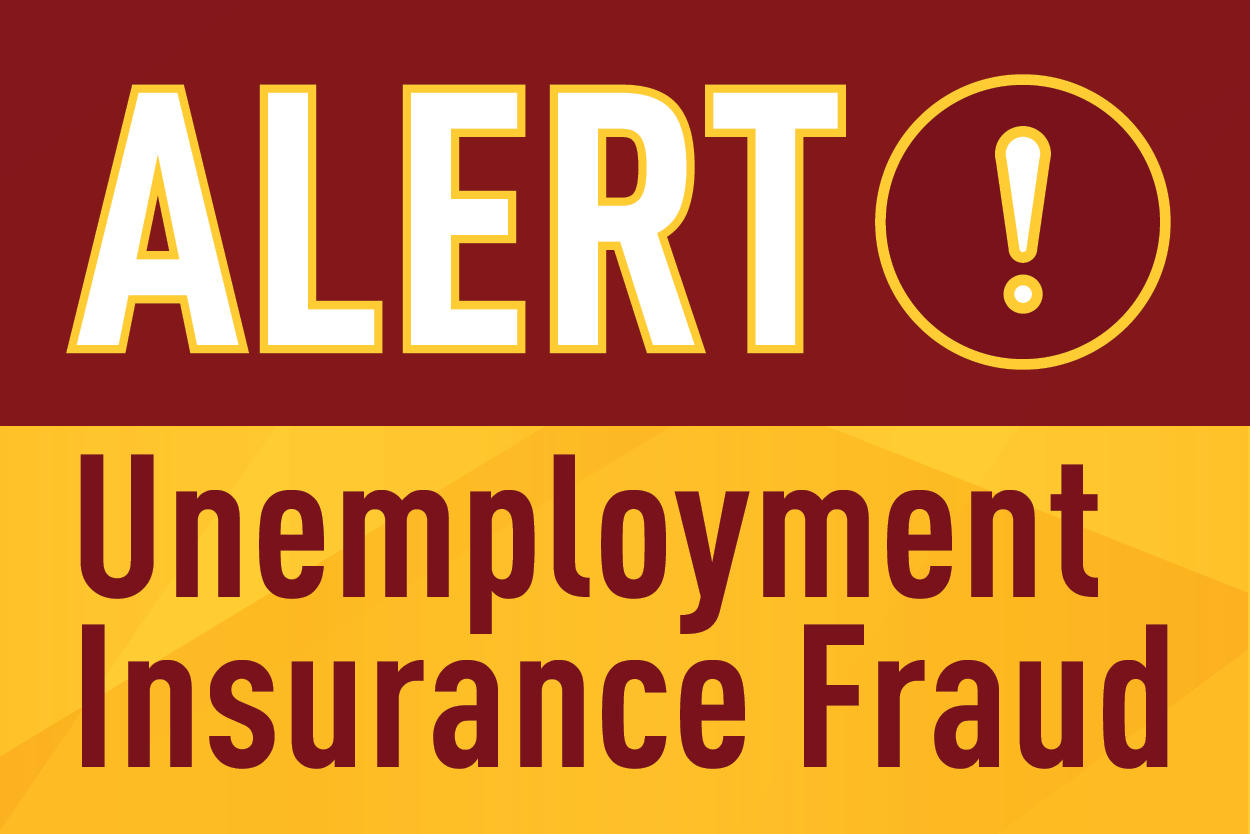HR Update

Unemployment Fraud
Higher unemployment levels and additional federal benefits in response to the impact of COVID-19 are making unemployment insurance a new target for fraud nationwide.
Beware of Text Messages or Emails from Minnesota Unemployment Insurance
June 29, 2021 Update
A scam is targeting those who are applying or receiving unemployment insurance using text messages and email. The scammer's messages may say something like:
Your MINNESOTA unemployment insurance claim is currently on hold for verification purpose. Please verify your claim by clicking the link provided below to sign in and activate your account.
The State of Minnesota will never send information to applicants via text or email. Do not click on the click or reply if you receive a message like this.
If you are University of Minnesota faculty, staff, or student staff and you have been affected by unemployment fraud, please report it to the Office of Human Resources, Employee Relations at erc@umn.edu.
More tips are available from OIT on what to do if you've been targeted by unemployment fraud.
Take Steps to Secure Your Identity
Employees who think they may have been the victim of this type of fraud should take these steps to report this incident and protect their private information:
- Report the fraudulent activity to erc@umn.edu immediately.
- File a report with the State of Minnesota.
- Freeze your credit
- Monitor your credit
- Review information from the Federal Trade Commission (FTC) about identity theft
- Talk with LSS Financial Counseling if you have questions about credit monitoring and finding trusted fraud protection resources. Call them at 1-800-528-2926 for a free consultation.
Signs You May be the Victim of Identity Theft
Be aware of these signs that you may be the victim of identity theft. If any of these incidents occur, take steps to report them right away.
- Receiving communications regarding unemployment insurance forms when they have not applied for unemployment benefits
- Unauthorized transactions on their bank or credit card statements related to unemployment benefits
- Any fees involved in filing or qualifying for unemployment insurance
- Unsolicited inquiries related to unemployment benefits
- Fictitious websites and social media pages mimicking those of government agencies
Fraudulent Unemployment Claims are on the Rise
With unemployment reaching record highs for recent history, the state of Minnesota is inundated with requests for unemployment and unemployment insurance. Fraudulent unemployment claims are not a result of a University security breach, rather the influx of unemployment claims makes it easy for a fraudulent request to hide or “get lost” in the system. The expansion of unemployment benefits provided by the federal government makes this fraud more lucrative than normal.
How this fraud appears to victims, according to current reports:
- A fraudulent request for unemployment benefits is submitted using information, such as Social Security Number (SSN), retrieved through currently unknown means
- Minnesota Department of Employment and Economic Development (DEED) creates an account and generates mail via USPS to the individual’s home address notifying them that an unemployment benefits account was created for them
Security expert Brian Krebs also published a useful blog post regarding fraud in state unemployment programs.
The University Works to Prevent Fraudulent Unemployment Claims
The Office of Human Resources works to prevent these fraudulent unemployment claims from being paid by:
- Verifying applicants who apply to the Minnesota Unemployment Insurance program to determine if they are a current or former employee. If the employee is a current (active) employee, then the University will notify the individual and try to determine if the application is legitimate or fraudulent. If the claim appears to be fraud, the University and the employee who had the application made in their name should contact the state unemployment insurance office.
- Monitoring its unemployment tax accounts on a daily basis to identify unexpected claims as early as possible.
- Working with IT security to monitor this fraudulent activity.
Nationally, the U.S. Secret Service is pursuing leads to shut down this fraud network. In the meantime, the University will diligently monitor unemployment claims and confirm the legitimacy of claims with its employees.